It is no longer news to anyone of how badly things have turned out in recent years for Nigerians; particularly since the advent of the President Bola Ahmed Tinunu led administration. Rising inflation in Nigeria has had significant economic impacts on the lives and economic survival of millions of Nigerians, affecting various sectors and the general well-being of its citizens. These catastrophic impacts have left millions of Nigerians spiralling down into the abyss of poverty with little or no "hope" of economic revival. Some of the major impacts include:
1. Reduced Purchasing Power
Inflation erodes the value of money, meaning that consumers can buy less with the same amount of money. In Nigeria, this translates into higher costs for goods and services, reducing the standard of living, especially for low- and middle-income earners. Basic necessities like food, transportation, and healthcare become increasingly expensive.
2. Increased Cost of Living
As inflation rises, the cost of living surges. Essential commodities, especially imported goods, see a sharp price increase due to the depreciation of the naira and rising import costs. This puts pressure on households as they struggle to meet their daily needs.
3. Rising Unemployment
Businesses face higher operating costs due to inflation, particularly in raw materials, energy, and transportation. To manage these costs, companies may cut jobs, reduce investment, or freeze hiring, which worsens the unemployment situation in Nigeria.
4. Reduced Investment and Business Growth
High inflation increases uncertainty in the economy, making investors hesitant to commit capital. The high cost of borrowing due to inflation-related interest rate hikes further discourages investments in productive sectors like manufacturing and agriculture, which are vital for Nigeria’s growth.
5. Monetary Policy Tightening
The Central Bank of Nigeria (CBN) typically responds to rising inflation by increasing interest rates in an attempt to control the money supply. While this may help curb inflation, it makes borrowing more expensive for businesses and consumers, slowing down economic growth.
6. Depreciation of the Naira
Persistent inflation often weakens the value of Nigeria's currency, the naira. A depreciated naira raises the cost of imports, worsening trade deficits and increasing inflationary pressures further. This can lead to a vicious cycle of inflation and currency depreciation.
7. Worsening Poverty
Rising inflation disproportionately affects the poor, as they spend a higher percentage of their income on essential goods like food and fuel. As inflation persists, more Nigerians are pushed below the poverty line, exacerbating social inequality and contributing to unrest and instability.
8. Debt Servicing Challenges
High inflation increases the cost of borrowing, both domestically and internationally. As Nigeria’s government debt grows, rising inflation makes debt servicing more expensive, diverting resources from critical areas like infrastructure development, healthcare, and education.
9. Impact on Savings
Inflation discourages savings because the real value of saved money decreases over time. This leads to reduced savings rates among the population, which can negatively affect long-term capital formation and reduce available funds for investments.
10. Social and Political Instability
Prolonged inflation can lead to social unrest as people protest against rising costs of living and unemployment. In Nigeria, inflation has historically contributed to strikes, protests, and political instability, as the government struggles to manage economic pressures.
However, despite the crushing impacts the situation has had on the cost of living; Nigerians have found several ways to adapt and cope with the economic challenges. Here are five key strategies:
1. Increased Emphasis on Small-scale Farming
Many Nigerians have turned to small-scale farming or backyard gardening to supplement their food supply. This reduces reliance on expensive market-bought goods, especially staples like vegetables, maize, and cassava.
2. Side Hustles and Diversified Income Sources
Due to inflation's impact on salaries and wages, many Nigerians have taken on side hustles to generate extra income. These range from online businesses, freelance work, ride-hailing services, to informal trading in goods like food and clothing.
3. Bulk Buying and Cooperative Societies
To counter the frequent price hikes of essential goods, Nigerians often buy items in bulk. Some also join cooperative societies that offer members access to discounted goods, shared resources, or loans with lower interest rates to cushion the economic blow.
4. Frugality and Spending Cuts
Nigerians are adjusting their lifestyles by cutting down on non-essential expenses. This includes reducing spending on luxury goods, entertainment, and imported products, while opting for more affordable, locally made alternatives.
5. Community Support Networks
Nigerians rely heavily on family, friends, and local community networks for financial and emotional support. This social safety net helps individuals cope with inflation-related hardships through shared resources, pooling funds, or informal lending arrangements.
In summary, rising inflation in Nigeria has far-reaching consequences, affecting not just economic growth but also social stability and the overall quality of life for its citizens. Addressing inflation requires coordinated monetary, fiscal, and structural reforms. Meanwhile, the aforementioned coping strategies developed by the people reflect the resilience of Nigerians as they navigate the challenges posed by rising inflation.
Impacts of Rising Inflation in The Nigerian Economy And 5 Ways Nigerians Are Coping with It.
